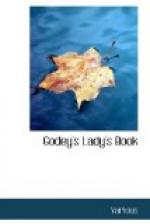And make him mild and quiet as a child.
Though now the bleak wind-king so boisterous seems,
And drives the tempest madly o’er the plain,
He smiles in Spring-time soft as April rain,
In Summer sleeps on flowers in zephyr-dreams.
* * * * *
BUBBLES.
BY JOHN NEAL.
“Hurrah for bubbles! I go for bubbles, my dear,” stopping for a moment on his way through the large drawing-rooms, and looking at his wife and the baby very much as a painter might do while in labor with a new picture. “Bubbles are the only things worth living for.”
“Bubbles, Peter!—be quiet, baby!—hush, my love, hush! Papa can’t take you now.”
Baby jumps at the table.
“Confound the imp! There goes the inkstand!”
“Yes, my dear; and the spectacles, and the lamp, and all your papers. And what, else could you expect, pray? Here he’s been trying to make you stop and speak to him, every time you have gone by the table, for the last half hour, and holding out his little arms to you; while you have been walking to and fro as if you were walking for a wager, with your eyes rolled up in your head, muttering to yourself—mutter, mutter, mutter—and taking no more notice of him, poor little fellow, than if he was a rag-baby, or belonged to somebody else!”
“Oh, don’t bother! Little arms, indeed!—about the size of my leg! I do wish he’d be quiet. I’m working out a problem.”
“A problem! fiddle-de-dee—hush, baby! A magazine article, more like—will you hush?”
Papa turns away in despair, muttering, with a voice that grows louder and louder as he warms up—
“Wisdom and wit are bubbles! Atoms and systems into ruin, hurled! And now a bubble burst! And now a WORLD! I have it, hurrah! Can’t you keep that child still?”
“Man alive, I wish you’d try yourself!”
“Humph! What the plague is he up for at this time o’ night, hey?”
“At this time o’ night! Why what on earth are you thinking of? It is only a little after five, my dear.”
“Well, and what if it is? Ought to have been a-bed and asleep two hours ago.”
“And so he was, my love; but you can’t expect him to sleep all the time—there! there!”—trotting baby with all her might—“Hush-a-bye-baby on the tree top—there! there!—papa’s gone a-huntin’—”
“My dear!”
“My love!”
“Look at me, will you? How on earth is a fellow to marshal his thoughts—will you be quiet, sir?—to marshal his thoughts ’the way they should go’—Mercy on us, he’ll split his throat!”
“Or train up a child the way he should go, hey?”
“Thunder and lightning, he’ll drive me distracted! I wonder if there is such a thing as a ditch or a horsepond anywhere in the neighborhood.”
“Oh! that reminds me of something, my love. I ought to have mentioned it before. The cistern’s out.”




